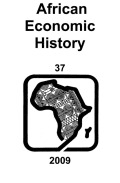
AFRICAN ECONOMIC HISTORY
Scope & Guideline
Transforming Understanding of Africa's Economic History
Introduction
Aims and Scopes
- Economic Sovereignty and Colonial Legacies:
The journal emphasizes the exploration of economic sovereignty in post-colonial contexts, examining how historical colonial practices continue to influence present-day economic conditions and power dynamics in African nations. - Political Economy of Historical Contexts:
A core focus lies in the political economy of Africa, investigating the interplay between political structures and economic activities throughout various historical periods, including colonial and post-colonial eras. - Labor Relations and Gender Dynamics:
The journal examines labor relations, particularly the roles and experiences of women in economic history, highlighting shifts in labor practices and their socio-economic implications across different timeframes. - Resource Management and Economic Development:
Exploration of how natural resources have been managed and exploited throughout history, and their impact on economic development and societal structures in African countries. - Interdisciplinary Approaches to African History:
The journal encourages interdisciplinary research that integrates economic history with sociology, anthropology, and political science to provide a more comprehensive understanding of Africa's economic past.
Trending and Emerging
- Neocolonialism and Economic Autonomy:
A significant trend is the examination of neocolonialism and its impacts on economic sovereignty, particularly in South Africa. This theme is gaining traction as scholars explore how historical colonial practices continue to shape economic dependencies. - Gender and Economic History:
The focus on gender dynamics within economic history is emerging as a prominent theme, with increasing research on women's labor relations and their historical roles in shaping economies across Africa. - Historical Perspectives on Contemporary Economic Issues:
There is a growing trend to relate historical economic analyses to contemporary issues, such as land politics, resource management, and economic development strategies, providing historical context for modern challenges. - Cultural and Social Influences on Economic Practices:
Emerging themes include the investigation of cultural and social factors that influence economic practices, highlighting the importance of local contexts in understanding economic history. - Environmental and Resource Economics:
Research focusing on the historical management of natural resources and its implications for economic development is becoming increasingly relevant, reflecting a broader interest in sustainability and environmental economics.
Declining or Waning
- Traditional Economic Metrics:
There appears to be a waning interest in traditional economic metrics and quantitative analyses, as scholars increasingly favor qualitative approaches that emphasize narrative and contextual understanding of economic phenomena. - Colonial Economic Policies:
Research specifically centered on colonial economic policies has declined, suggesting a shift towards broader thematic explorations that integrate colonial legacies with contemporary economic issues rather than focusing solely on historical policy analysis. - Narrow Regional Studies:
There is a noticeable decrease in studies that focus narrowly on specific regions or countries, indicating a trend towards more comparative and continental perspectives that seek to draw connections across different African contexts.
Similar Journals

Estudios de Historia Moderna y Contemporanea de Mexico
Illuminating Mexico's Historical Journey for Scholars and EnthusiastsEstudios de Historia Moderna y Contemporanea de Mexico, published by the UNAM, INST INVESTIGACIONES HISTORICAS, serves as a vital resource for scholars and enthusiasts in the fields of modern and contemporary Mexican history. With an ISSN of 0185-2620 and E-ISSN of 2448-5004, this journal has been Open Access since 2010, ensuring that researchers, professionals, and students can freely access a wealth of knowledge without barriers. Situated in Mexico and operating from CIUDAD UNIV, the journal offers insight into significant historical narratives spanning from 2009 to 2024. Ranked in the Q3 category for history in 2023 and positioned at Rank #1177/1760 in Scopus, it provides a unique platform to explore diverse historical perspectives, making it a crucial publication for advancing research within its academic community.

Critical Historical Studies
Fostering Critical Engagement with the PastCritical Historical Studies is a distinguished peer-reviewed journal published by University of Chicago Press, dedicated to advancing the discourse in the field of history. Since its inception in 2015, it has carved out a significant niche, achieving a remarkable Q1 ranking in the history category for 2023 and placing 219th out of 1760 in the Scopus Arts and Humanities History rankings, reflecting its profound impact and reputation in the field. The journal's scope encompasses a wide range of historical analyses, fostering critical engagement with historical methodologies and interpretations. Although not an open access publication, Critical Historical Studies provides a valuable platform for researchers, professionals, and students alike, encouraging scholarly dialogue and the exploration of innovative perspectives in historical study. With a vibrant editorial board and a commitment to publishing high-quality research, this journal is essential for those looking to deepen their understanding of historical processes and narratives.

INTERNATIONAL JOURNAL OF AFRICAN HISTORICAL STUDIES
Fostering Insightful Discourse on Africa's Historical JourneyInternational Journal of African Historical Studies is a leading academic journal published by the African Studies Center at Boston University. With its ISSN 0361-7882 and E-ISSN 2326-3016, this journal serves as a vital platform for scholarly discourse in the fields of History, Cultural Studies, and Sociology. Renowned for its rigorous peer-reviewed research, the journal holds a commendable Q1 ranking in History and Q2 in Cultural Studies as of 2023, highlighting its influence and contribution to African historical scholarship. The journal has been published since 1976, consistently providing insightful analyses and critical research that engage with Africa's past and present, thereby enriching our understanding of global histories. Although it does not offer an open-access model, the journal is accessible through various academic databases and institutions. Its mission is to foster a deeper understanding of African histories by publishing high-quality, innovative research that reflects diverse perspectives, making it an essential resource for researchers, professionals, and students dedicated to the study of African history and cultural dynamics.
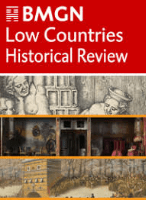
BMGN-The Low Countries Historical Review
Fostering Open Access to Historical NarrativesBMGN-The Low Countries Historical Review, published by the KONINKLIJK NEDERLANDS HISTORISCH GENOOTSCHAP, is a distinguished open-access journal dedicated to the study of the history of the Low Countries, offering insights and diverse perspectives on historical developments from the region. With an ISSN of 0165-0505 and an E-ISSN of 2211-2898, this journal has been a valuable resource since its inception in 1970, with its rich archive covering pivotal years including 1975 and periods from 1999 to 2002, as well as the continuous series since 2009. With a notable impact factor supporting its reputation—scoring a commendable Q3 in History and achieving the 85th percentile rank within the Arts and Humanities category—BMGN is instrumental in fostering scholarly dialogue and advancing historical discourse. The journal's open-access format ensures broad access to its content, supporting researchers, professionals, and students keen to explore the intricate tapestry of Low Countries history. With its office located in The Hague, Netherlands, BMGN continues to be a pivotal forum for historical engagement and publication.

Revista de Historia Industrial
Exploring the Threads of Industrial EvolutionRevista de Historia Industrial, published by UNIV BARCELONA, DEPT HISTORIA, INST ECONOMIQUES, is a premier journal dedicated to the field of industrial history. With a proud ISSN of 1132-7200 and E-ISSN 2385-3247, this esteemed publication has been instrumental in shaping scholarly discourse since its inception in 1996, notably covering a wide array of topics related to industrial development, economic transitions, and historical methodologies through its issues published from 2011 to 2024. Distinguished by its Q1 ranking in History and its influence reflected in a 73rd percentile position among arts and humanities journals, the journal facilitates access to valuable insights for researchers, professionals, and students alike. While it is not an open access journal, its commitment to rigorous academic standards and insightful analyses ensures its relevance in the ever-evolving field of industrial history, providing an essential platform for the exchange of knowledge and innovative research. The journal's multi-faceted scope also intersects with the history and philosophy of science, making it a vital resource for interdisciplinary studies as well.
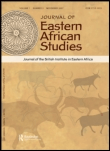
Journal of Eastern African Studies
Illuminating the Past and Present of Eastern AfricaJournal of Eastern African Studies, an esteemed publication within the field of anthropology, cultural studies, history, and political science, is published by Routledge Journals, Taylor & Francis Ltd from its base in the United Kingdom. With an impressive impact factor reflected by its Q1 ranking in multiple categories—including anthropology, cultural studies, and history—this journal stands as a critical resource for scholars and professionals interested in understanding the complexities of Eastern Africa. Since its inception in 2009, the journal has explored diverse themes pertinent to the region's socio-political landscape, indigenous cultures, and historical trajectories, while contributing significantly to ongoing academic discourse. Although currently not an open-access journal, its commitment to high-quality scholarship and its accessibility through major academic databases underscore its importance in advancing research and fostering deeper insights into Eastern African Studies. The journal's rigorous peer-review process ensures that only the most relevant and impactful research is disseminated, solidifying its position as a leading outlet in the field.
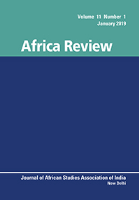
Africa Review
Fostering Critical Dialogue on African IssuesAfrica Review is a prestigious journal published by BRILL that specializes in the interdisciplinary examination of the African continent across various domains including development, history, and political science. With an ISSN of 0974-4053 and E-ISSN 0974-4061, this journal has established itself as a vital platform for researchers and scholars aiming to address critical issues related to Africa's socio-political landscape. The journal's converged years from 2009 to 2024 indicate its ongoing commitment to advancing knowledge in its fields, evidenced by its ranking within the Q4 category in Development, Q2 in History, and Q3 in Political Science and International Relations as of 2023. Furthermore, its competitive Scopus ranks reflect the journal's impact, with a notable 93rd percentile in Arts and Humanities for History. Although it does not currently offer open access, Africa Review remains an essential resource for anyone engaged in the study of contemporary African issues, making significant contributions to scholarly discourse and policy-making in the region.
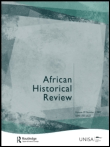
African Historical Review
Shaping Scholarly Dialogues on African HistoryAfrican Historical Review is an influential journal published by Routledge Journals, Taylor & Francis Ltd, dedicated to advancing the field of African history and cultural studies. With an ISSN of 1753-2523 and an E-ISSN of 1753-2531, this publication serves as a critical platform for scholars to disseminate original research spanning a diverse range of topics related to the continent's historical narratives and cultural dynamics. Operating from the United Kingdom, the journal plays a pivotal role in shaping dialogues around Africa's past and present, reflected in its categorization within the Q3 quartile for both Cultural Studies and History as of 2023. Although not an open-access journal, its comprehensive analyses and thought-provoking articles are crucial for researchers, professionals, and students who seek to deepen their understanding of African historical contexts. As the journal transitions through converged years, fostering interdisciplinary connections, it aspires to elevate the discourse in the humanities, proving resourceful for those engaged in historical studies across academia.
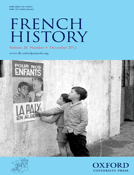
French History
Bridging Ancient Origins with Contemporary InsightsFrench History, published by Oxford University Press, is a prestigious academic journal dedicated to the exploration and analysis of France's rich historical narrative from its ancient origins to contemporary developments. With an ISSN of 0269-1191 and an E-ISSN of 1477-4542, this journal has been a vital resource for scholars and researchers since its inception in 1987. Covering a wide range of topics within the field of history, it ranks in the Q2 category in the 2023 evaluation, reflecting its robust scholarship and relevance. French History provides an indispensable platform for innovative research, facilitating a deeper understanding of the cultural, social, and political dynamics that have shaped France. Although it does not offer open access, its articles are meticulously curated to engage academics and practitioners interested in the multifaceted exploration of French history. With a Scopus ranking placing it at #1016 in the Arts and Humanities History category, this journal remains a cornerstone for those committed to the study of French historical scholarship.
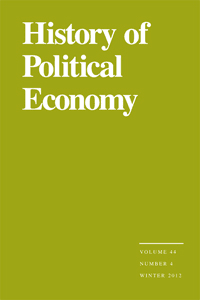
HISTORY OF POLITICAL ECONOMY
Decoding the Historical Narratives of Economic PoliciesHISTORY OF POLITICAL ECONOMY, published by DUKE UNIVERSITY PRESS, stands as a premier journal in the interdisciplinary fields of political economy and history. With an ISSN of 0018-2702 and an E-ISSN of 1527-1919, the journal provides a platform for rigorous scholarship that spans from its converged years beginning in 1986 to the present, aiming to elucidate the complex interplay between economic policies and historical contexts. It holds impressive rankings, peaking in the Q1 category for History and Q2 in Economics and Econometrics as of 2023, showcasing its impact and prestige in the scholarly community. Notably, it is ranked within the 88th percentile in Arts and Humanities History and maintains a significant presence in the 24th percentile for Economics and Econometrics. Although it does not currently offer open access, the journal remains committed to advancing knowledge and fostering thoughtful discourse among researchers, professionals, and students alike. Located in Durham, NC, the journal is dedicated to exploring the rich historical narratives that have shaped economic thought and policy, making it an essential read for those seeking to navigate the intricate landscape of political economy.